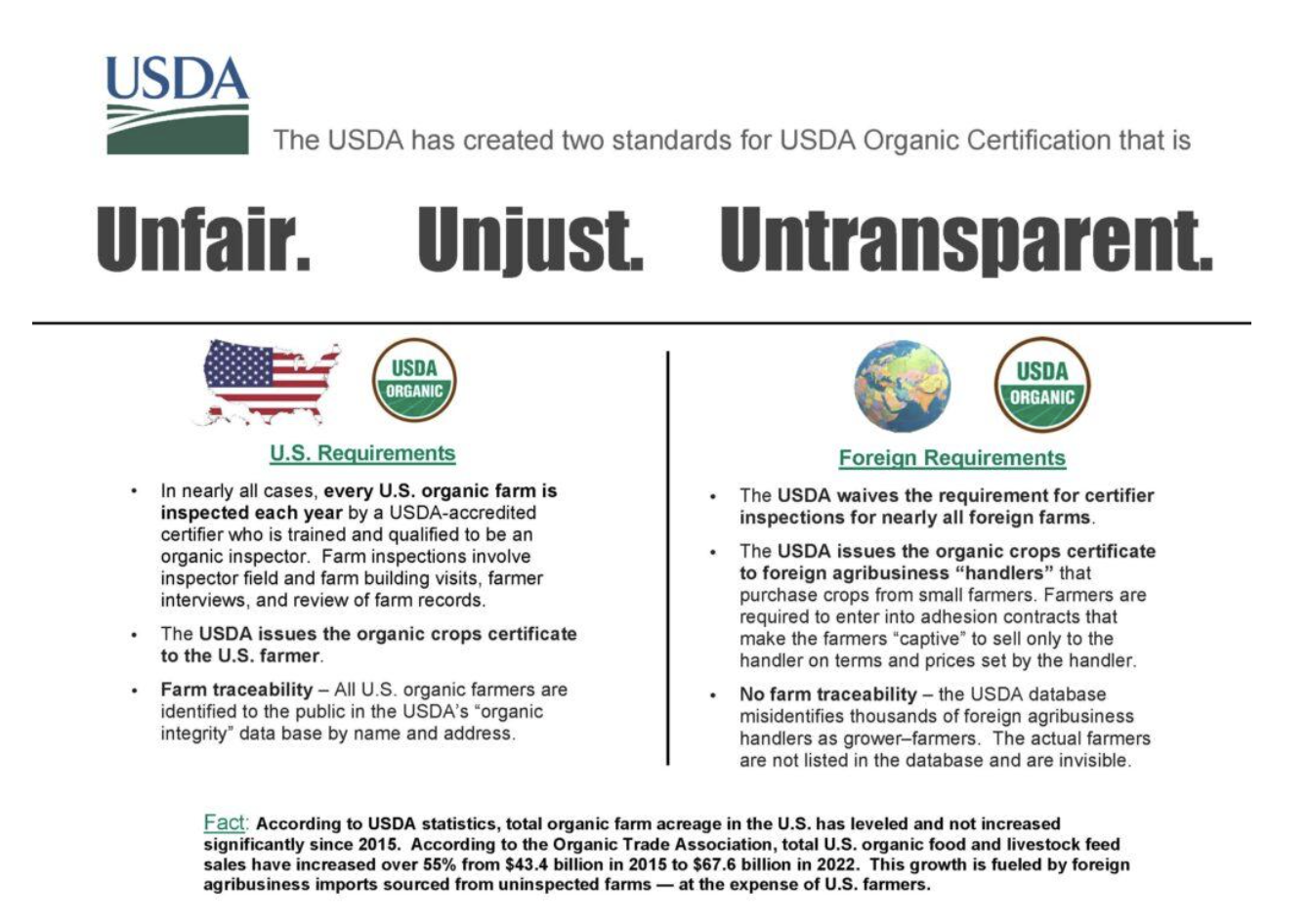LA FARGE, WIS. — Last fall an Oregon organic hazelnut farmer filed a federal lawsuit against the USDA alleging the agency’s complacency in allowing massive imports that do not meet the federal statutory requirement that all certified farms be inspected on an annual basis. The lawsuit suggested this opens up a large percentage of the US organic food supply to wholesale fraud.
Instead of collaborating with the farmer-plaintiff and the nonprofit farm policy research group backing the effort, OrganicEye, to tighten up oversight on international organic production, a consortium of business interests has now filed an amicus (“friend of the court”) brief on behalf of the USDA and the status quo, worth billions of dollars in international commerce.
The effort to stymie the lawsuit was led by two powerful trade-lobby groups (the Organic Trade Association and an international group, IFOAM), four business enterprises marketing foreign organic imports (Equal Exchange, Dr. Bronner’s, Natural Grocers, and Frontier Co-op), a Guatemalan coffee producer (Manos Campesinas), and two nonprofits (Alliance for Organic Integrity and Center for Food Safety).
With billions of dollars of commerce at stake, the lobbyists at the Organic Trade Association (OTA) started organizing the industry as soon as the lawsuit was filed in October 2023.
“Based on a clear profit motivation, the amicus brief just filed attempts to defend the un-defendable,” according to Mark Kastel, executive director of OrganicEye and one of the researchers focusing on the certifying of “groups” — sometimes comprising thousands of growers each — rather than individual farms.
The foreign farms are almost entirely uninspected, with regulatory oversight delegated to the businesses buying the crops instead of a legally-mandated USDA-accredited certifier.
“This profound conflict of interest is damaging to US farmers, creates a pathway for fraud, and is in clear violation of the requirements stated in the Organic Foods Production Act passed by Congress in 1990,” Kastel added.
The lawsuit was filed by Bruce Kaser, a semi-retired lawyer and certified organic farmer-member of OrganicEye, who grows hazelnuts near Salem, Oregon.
Kaser instigated an investigation with the United States International Trade Commission in doing the initial in-depth investigation into why US nut growers couldn’t compete with cheap foreign imports.
“Not only have we found that the exporting farmers, from countries like Turkey, didn’t go through the same legally-mandated rigorous annual inspections that US organic farmers comply with, but also that the trading back and forth between all kinds of shady foreign entities resulted in the foreign farmers receiving almost the same price for organic nuts as conventional,” Kastel added.
Turkey is just one of the countries with endemic levels of past commercial and organic fraud where agribusinesses are being allowed to supervise the certification of their own suppliers.
Although the trade groups claim a prime motivation for legally fighting the lawsuit is based on defending the interests of small subsistence farmers in developing countries — discounting their own direct interest in the billions of dollars in commerce they reap as a result — OrganicEye notes that the reality of how many of these farmers are being treated is being glossed over.
“The fact of the matter is that most of the farmers in these groups have become indentured servants,” said Kastel. “Unlike American farmers who can take the highest bid for their crops, these small farmers, who are theoretically overseen by the agribusiness purchasing their commodities, are required to sell only to that single business and have no access to the free market, domestically or internationally, for their organic goods.” The amici filing concedes that these growers are living in poverty.
According to OrganicEye’s research, this has resulted in both foreign organic farmers and US organic growers being economically injured. One of the amici filers, Equal Exchange, a $70 million per year agribusiness, purchases hazelnuts sourced from suppliers in Turkey, where a matrix of middlemen and shippers dominate the exports. By the time the nuts get to the US, Turkish-supplied “organic” hazelnuts are effectively shutting American farmers out of the organic market, with very little economic benefit going to growers overseas.
“There seems to be very little concern on the part of the business interests regarding the potential damage uninspected foreign imports do to the reputation of the organic label in the eyes of organic consumers,” Kastel lamented. “According to USDA data released in February, there has been negative growth in the number of US organic farms in recent years as the aggressive market growth has been filled by dubious foreign imports.”
Just this week, a sixth-generation Nebraska grain farmer and member of the USDA National Organic Standards Board, Amy Bruch, told a public forum trying to crack down on organic fraud that, even setting aside price erosion from imports, none of her regular wholesale buyers would even bid on her 2024 crop.
“The widespread ineffectiveness of USDA oversight, including the system of group certification where the inspection of farms is delegated to for-profit foreign certifiers and the foreign agribusinesses who market the products, is crushing American farmers and jeopardizing what we have all built together in the organic movement,” OrganicEye’s stated Kastel.
-30-

MORE:
A number of startling revelations were made by lawyers representing the USDA in their response to the court regarding Kaser’s lawsuit:
- Despite previous public statements to the contrary, the USDA’s National Organic Program (NOP) now admits that it does not require certifier inspection of farms in foreign grower groups.
- NOP states it is likely that approximately 80% of “organic” foods imported into the U.S. come from farms that were not inspected by certifiers.
- The NOP concedes this has been happening for decades and, therefore, should continue unchanged.
- There is no evidence that US consumers, who have always been told that organic farms are universally inspected, are aware of this practice, or that US farmers support uninspected group certification.
- Calling it necessary to give small foreign farmers access to the US organic market (in many cases at the expense of US growers), the NOP approves giving a foreign agribusiness an organic certificate to import raw and processed food into the US so long as the agribusiness forces small foreign farmers to enter into exclusive contracts with the business.
- The foreign farmers take the price they are given with no ability to go elsewhere. This is a sweetheart deal for agribusinesses that enjoy billions of dollars in profit from the USDA seal. Most of the groups are not cooperatives but merely comprised of the supplier lists for the agribusinesses. They generate crop production from thousands of acres at a certification cost that is not significantly higher than what a single US farmer pays – all coming from almost universally uninspected farms.
When Bruce Kaser filed his lawsuit on behalf of Pratum Farm, LLC, on October 17, the prominent US organic industry lobby group, the Organic Trade Association (OTA), immediately sprang into action by calling for a general membership meeting to address the challenge to the supply chain of many prominent corporate agribusinesses.
Recognizing that Kaser was on firm legal footing in his challenge, the OTA vowed to fight the lawsuit and, in the event of a loss in court by the USDA, suggested going back to Congress to amend the Organic Foods Production Act (OFPA) by codifying the current system that allows for the certification of hundreds or thousands of farmers together by the agribusinesses that purchase their commodities.
OrganicEye, widely known as an organic industry watchdog, has proposed an alternative legislative fix that would completely revamp group certification to ensure creditable oversight and economic justice for the farmers involved both in the US and abroad. Elements of their plan address the following issues:
- Any imported commodity that is commercially produced in the United States would have to go through the same rigorous certification as US growers, including annual farm inspections. This would not ban imports but would harmonize the regulatory requirements by eliminating the option of group certification and upholding the intent of Congress in OFPA.
- Group certification was originally envisioned as covering concise communities or cooperatives where members of the groups had personal relationships and shared resources (“peer certification”). No current geographic limitations exist and need to be established.
- Currently, there are no limits to how many farmers can be members of a group.
- Currently, there is no limit to the size/scale of the farming operation. Amici filers claim that they are representing the interests of small landholders. But uninspected group certification opens the door to fraud and large commercial farms gaming the system by exporting to the US without undergoing inspection. Acreage/dollar volume limitations need to be established.
- All administration and inspection of farms that are members of groups would need to be conducted by USDA accredited certifiers, eliminating the conflict of interest of the buyers, processors, and marketers overseeing the process.
- Captive contracts would be eliminated. Group members certified under the revised law would be free to sell their commodities to the highest bidder (switching buyers and certifiers, if so desired).

